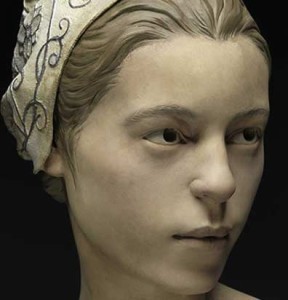
“Jamestown Jane” – Reconstructed face of a 14-year-old girl thought to have been cannibalized in 1609 by the Jamestown Colony.
There are at least six hand-written accounts by colonists mentioning the fact, including this one by George Percy, the governor of Jamestown at the time:
“…Notheinge was Spared to mainteyne Lyfe and to doe those things which seame incredible, as to digge upp deade corpes outt of graves and to eate them. And some have Licked upp the Bloode which hathe fallen from their weake fellowes.”
But no physical evidence had ever been uncovered, until now. The bones of a 14-year-old girl were dug up in the fort cellar. They contained cleaver and knife marks, according to archeologists: all signs of cannibalism.
Colonists had called the dreaded winter of 1609, “The Starving Time.”
Though they’d been an established colony since 1607, they were still learning how to become self sufficient. A drought hindered their summer growing season, and when Captain John Smith returned to England for the treatment of an injury, relations broke down between the colony and the local Indians, who had, until then, been friendly.
When the winter came, they did what they must to survive. Even so, only 60 of 300 remained in the spring. Could it be that only the people willing to eat their friend’s flesh survived?
Here’s Your Prompt:
- Make a list of things that people do in desperate times — murder, cannibalism, betrayal, robbery — and write a story or poem about it.
- Write about a time when * you * were desperate. What did you do?
- What is quiet desperation? Write about it.
- Write about a desperate phone call.
- Write about a time you were desperate to impress someone.
- William Penn wrote in The Fruits of Solitude, “As a Desperate Game needs an able Gamester…” What did he mean? Write about a “desperate game.”